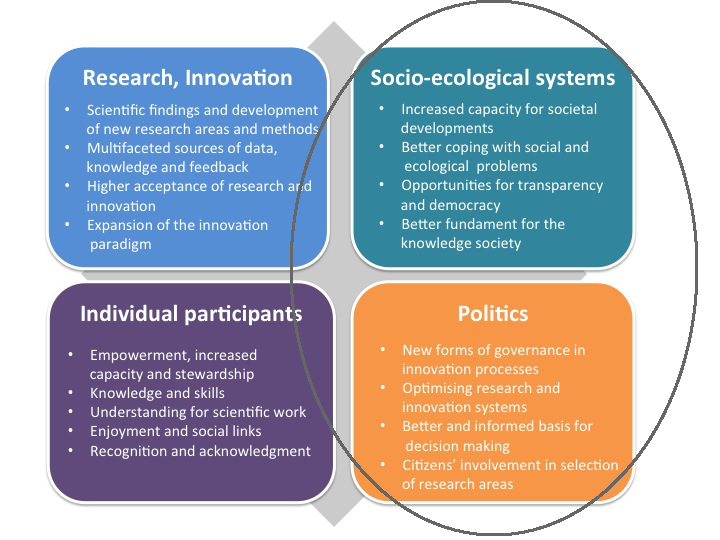Here evaluation considers the wider social, ecological, economic and political context in which projects are embedded. We take a look beyond the citizens who are directly involved in the citizen science projects; we look at the project’s impact on their communities, regions, the environment or economy. Of course impacts on these levels are even more difficult to evaluate: there are so many different factors, which influence these contexts and are not in the control of a research project, and effects on these levels might take a long time before they become visible. Nevertheless evaluators can at least try to consider taking a wider look, as this might be especially relevant for citizen science projects that are initiated by local communities, originating outside of academia.

Figure taken from Schaefer T. and B. Kieslinger (2016).‘Supporting emerging forms of citizen science: a plea for diversity, creativity and social innovation’. Journal of Science Communication (JCOM) 15 (02), Y02.
In these community-driven projects scientists and experts are often involved in collaborative projects in order to provide evidence in support of campaigns and political decisions regarding issues such as pollution, health hazards, or species conservation. So these projects aim for transformative change and an impact on the dominating socio-ecological systems.
Some evidence for the socio-ecological impact could be, for instance, collected in citizen science projects related to air quality monitoring. These projects proved that involving citizens in the collection of air quality data, can not only increase their knowledge, but have a wider impact, such as stimulating discussions with political decision makers, influencing political decisions, and co-developing measures to avoid exposure to air pollutants.
Thus individuals’ learning and behaviour change can cascade to and affect whole communities and regions, as individual citizens might diffuse their knowledge, and drive civic action and policy forming.
Further impacts from these actions, like reductions in pollution or health effects, might take even longer and be a result of the higher civic engagement and policy forming.